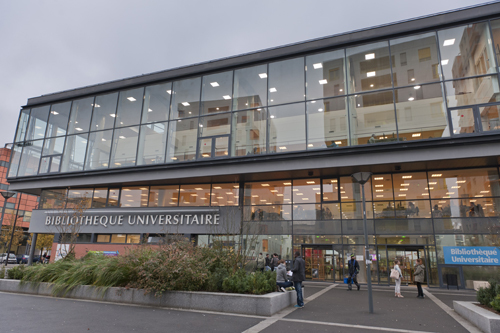 Lucie Tryoen is an electronic resources librarian at the University of Evry-Val d’Essonne in France. Her excellence in library outreach and her ability to define her approach to it won her a JoVE travel award to the Charleston Library Conference.
Lucie Tryoen is an electronic resources librarian at the University of Evry-Val d’Essonne in France. Her excellence in library outreach and her ability to define her approach to it won her a JoVE travel award to the Charleston Library Conference.
Tell us about your background, and how your early experiences shaped your communication activities.
I took my first job as a librarian in the University of Evry Val d’Essonne in April 2017. I managed to become the resource person for faculty members concerning electronic resources. I did this through email campaigns that highlighted new resources or the testing of potential interesting databases. I also wrote resource presentation flyers on specific subjects and visited labs. So, strengthening communication with the faculty was my main goal, and the university offers both difficulties and opportunities for this challenge.
Can you elaborate on the challenges involved?
The university houses 17 labs, nine of which are also attached to one or more other institutions, such as the CNRS. Due to this institutional setup – very common in France but particularly expanded in Evry — not all the researchers have a sense of belonging to the University of Evry. Moreover, the University of Evry is integrated with the Université Paris-Saclay. This comprises universities, “grandes écoles” and research organizations. As many research projects are shared within Paris-Saclay, the Evry facility may not seem like a major hub for faculty members.
And you said there were advantages, too?
Being a small university, with less than 15,000 attending, means that for students and teachers, the main library is a highly recognizable place. Within the library, the size of the staff — 40 people — makes it possible to have well-defined interlocutors. I’m personally in charge of the entire workflow of electronic resources, from the relationship with publishers to promoting the library to the public.
So, JoVE played a part in your outreach?
Yes. After a successful trial of JoVE Science Education in October 2017, we decided to expand our dialogue among teachers. Since our JoVE subscription is dedicated to education, it was especially relevant to consider its acquisition in partnership with the faculty. For a first experiment, we decided to focus on one field: biology — the best choice, considering the university’s area of expertise. Evry had a huge opportunity, because it had a program dedicated to financing innovative projects that promote student success.
Can you elaborate the how behind promoting JoVE?
JoVE become part of our project “Teaching differently,” which highlighted the need to modify teaching practices to better serve students. The acquisition of reverse or interactive pedagogy tools, such as JoVE Science Education videos, is essential in this process. The first step was to find volunteer teachers to participate in the project. I agreed to be the project leader, and to be responsible for deploying the application, and for most of the workload involved with it. That included producing documents, handling relationships with the relevant departments of the university, etc.
This required close collaboration with faculty and administration, yes?
We opened new individual trials for interested teachers and organized contacts with Christophe Deschamps, the JoVE salesman responsible for our region. Additionally, I gathered a project team of three undergraduates, one educational engineer, and two librarians (the biology procurement librarian and I). This project, jointly developed by the university library and the biology department, was selected for funding by a steering committee in May.
After the JoVE selection, the project team held its first meeting to fix the schedule, and the division of labor between teachers and librarians. We also all met together with Christophe for a display of the JoVE Science Education database and its features. The selection of videos for the courses is obviously the teachers’ responsibility, while the librarians are in charge of writing student tutorial materials. We will also organize on-demand training workshops at the library.
You and your colleagues are looking at expanding your JoVE usage?
We’re planning a new meeting for August to look at integrating videos into the university’s educational platform, called E-Media. Each course in this platform has a dedicated interface for teachers to upload the necessary classroom documents: including a bibliography, a semester session plan, etc. We’ll include JoVE on this platform — accessible to students via the “embed” functionality or through just a link to JoVE.com. We’ll do this to make sure we reach the students via the computer interface they are familiar with. The steering committee will judge the success of the project before financing it another year, according to various criteria, established upstream — these include usage statistics, of course, but also students and teachers’ satisfaction surveys.
What’s your take?
This project is an invaluable opportunity to strengthen ties between the library staff and the faculty. We librarians, in this project, have a supportive role with teachers, as they may not have time to handle the administrative management of the subscription. They may not understand the technical aspects of JoVE, including how it provides resources for their courses. They may not grasp how to train teachers and students about using these new resources. On the other hand, it’s well known there is an incentive for teachers to encourage the students to use electronic resources. Subscribing to an educational resource without the involvement of the teaching team would be useless.
As JoVE Science Education covers different fields in the hard sciences, we can consider the extension of this collaborative work dynamic to other teaching staff, in chemistry, physics or engineering. We are confident that, after the first year of the project, new teachers will join the project team, allowing teachers and librarians to work strongly together serving students.



